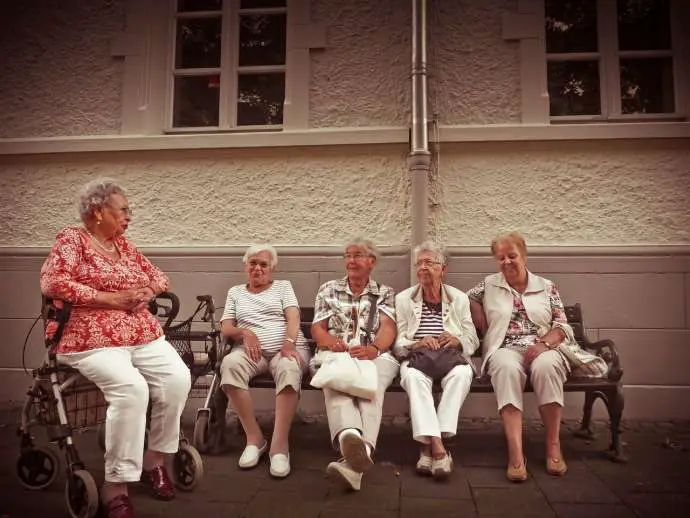STA, 5 October 2020 - Prime Minster Janez Janša presented a draft bill on a National Demographic Fund, a new overarching state fund designed to pool all state assets to shore up the pension system, to the Economic Social Council (ESS) on Monday before the government adopted it later in the day.
Janša told the government's social partners on the ESS - employers and trade unions - it would be only right for the generation of pensioners which created state assets to benefit from them when it retired.
He said part of the funds would go for pensions, part for long-term care and part for construction of care homes and for family policy measures.
The bill, which follows the principle of social justness, will be discussed by the ESS and in parliament simultaneously, and the debates will aim to be as efficient as possible so as to prevent unnecessary delays, Janša was quoted as saying by his office.
The Finance Ministry noted as the government adopted the bill today that the costs of population ageing would increase from 21.9% of GDP in 2016 to as much as 28.2% by 2070. The number of pensioners is expected to rise by some 20% in the next 50 years.
The bill is to take over the assets currently held by Slovenian Sovereign Holding, the bad bank, the para-state DSU and KAD funds, the pension insurer Modra Zavarovalnica and the stake in insurer Zavarovalnica Triglav currently held by public pension insurer ZPIZ.
The assets to be managed by the Demographic Fund are currently valued at almost EUR 8.6 billion and according to current plans, 40% of dividends and 60% of proceeds from the sale of stock would be retained so that the assets under management grow in the long term. 40% of the dividends would finance public pensions, while the rest would go towards financing family policies and construction of nursing homes.
Following Janša's presentation of the bill, Jakob Počivavšek of the Pergam association of public sector trade unions told the press a proper debate would still have to be held at an ESS session and within the negotiating group which the ESS has already established.
He said Pergam found some points controversial, including the use of funds for day-to-day costs and the absence of other sources of financing. The union is also reserved about the idea of merging assets and the influence of politics on the management of assets.
Employers' Association head Jože Smole said he expected a constructive debate. "Our starting point needs to be that this bill, given its importance, receives the widest possible social consensus, with social dialogue being one of the options of coordination," he said, expressing optimism about the outcome.
Smole welcomed Janša's decision to present the bill in person, saying this was a sign of respect for social dialogue.
Director general of the Chamber of Commerce and Industry (GZS) Sonja Šmuc said employers were mostly interested in how companies under the fund would be able to develop. "It is important to find the right balance between the investment and dividend policies," she said.
Secretary general of the Union of Shop Assistants Ladi Rožič expressed concern that there "will not be enough money to fulfil all the wishes". Janša said all remarks would be taken into account, but there will most certainly be a lot of desires, Rožič said.
In the afternoon, the prime minister also discussed the bill and the rival opposition-sponsored bill on the new fund with the head of the Association of Pensioners (ZDUS), Janez Sušnik. Sušnik told the STA both bills had some good solutions, but while the government's is bolder, the opposition's is more savings-oriented.
Sušnik and Janša agreed that a ZDUS task force will prepare its remarks to the government proposal within 10 days. ZDUS welcomes the planned concentration of state investments within the fund but only if no assets are sold, Sušnik said.
A potentially good solution from the opposition-sponsored bill is according to ZDUS collecting part of the funds from excise duties, income tax and other sources.
The opposition Social Democrats (SD) also started presenting their bill today after submitting it to parliament with the support of the fellow opposition Alenka Bratušek Party (SAB).
The proposal, which stipulates that the money generated with the help of the fund would be used exclusively for pensions after 2040 and for protecting strategically important companies from privatisation, was presented to the ZZZS trade union confederation, but the SD would also like it discussed by the ESS.
The opposition Marjan Šarec List (LMŠ), the Left, SD and SAB today repeated their criticism of the government-sponsored bill, with LMŠ head Marjan Šarec saying it envisaged looting of all that was left in this country. Labelling the fund a smokescreen, he said it was a way to bribe the Pensioners' Party (DeSUS), which has been demanding such a fund.
Left leader Luka Mesec said the bill was about "the kidnapping of state assets" and warned that some of Slovenia's strategic companies could fall in the hands of the oligarchy around Hungarian Prime Minister Viktor Orban.
All our stories on demographis in Slovenia






